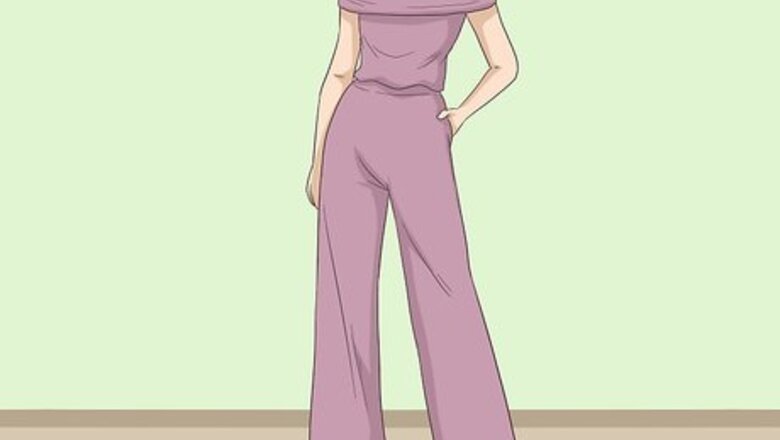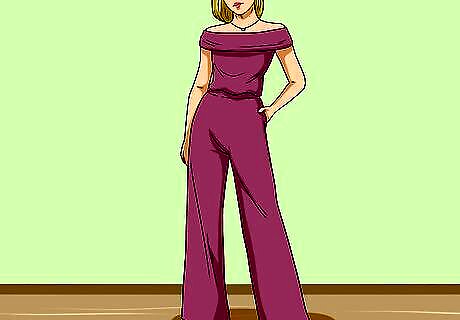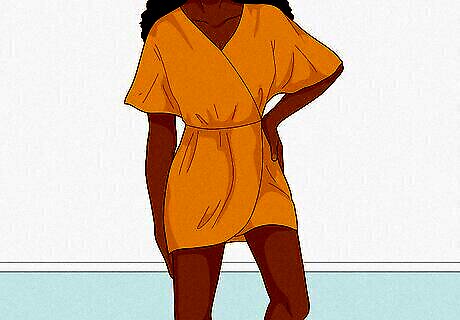
views
What is the Aphrodite body type?

Aphrodite’s body type was soft and slightly curvy with small breasts. In artwork from Ancient Greece and in other similar cultures, Aphrodite—the Greek goddess of beauty and love—is depicted with a slightly curvy and soft body type. She has a very romantic body type and a traditionally feminine figure with small breasts, soft features, hips, and a slightly rounded stomach. Given that Aphrodite (or Venus, in Ancient Rome) was the goddess of beauty, this type of body is considered the beauty standard of ancient Western civilizations. Aphrodite was also one of the most important Greek goddesses, according to comparative mythologist Maria Souza. So, in ancient times, her form and visage were used in many artistic works and even worshipped in religious temples. Meet the wikiHow Experts Maria Souza is a comparative mythologist and founder of Women & Mythology. She guides women on a journey to rediscover their true selves through the power of myths. Rachel Eddins, M.Ed., LPC-S, is a licensed professional counselor who specializes in working with clients with eating disorders, anxiety and depression, and relationship issues. Kim Chronister, PsyD, is a licensed clinical psychologist who specializes in helping people struggling with relationship problems, eating disorders, and personality disorders. Lauren Urban, LCSW, is a licensed psychotherapist who has worked with children, families, couples, and individuals, providing an anti-oppressive, identity-affirming space. Asa Don Brown, PhD, DNCCM, FAAETS, is a clinical psychologist with over 30 years of experience working with families, children, and couples.
What is the ‘Aphrodite body type’ on social media?
On social media, users say “Aphrodite body type” to celebrate their bodies. In the wake of modern beauty standards and especially the rise of ultra-filtered, unattainable beauty standards bolstered by social media and the popularity of cosmetic surgeries, some content creators and social media users have been posting about the “Aphrodite body type.” Basically, they’re sharing that they’ve been told to hate their “soft” body parts their whole lives. Society has told them to have a completely flat and hard stomach, cellulite-less thighs, zero stomach rolls, and arms without any excess skin. However, artistic depictions of Aphrodite have a lot of these features, so people are reclaiming them as beautiful and worth celebrating! For example, this video by @izzierodgers shows the creator in an outfit that reveals her stomach and side rolls (she points out these body parts in the video). The caption reads, “When I feel sad about my body type, I remember it was literally the body type of the goddess of beauty.” This video by @thatasiangirl2000 reads, “For any ladies struggling with their body shape, let me remind you of Aphrodite.” Then, it shows a compilation of images of Aphrodite statues—some of which have visible stomach pouches, thick thighs, stomach rolls, and cellulite. Another video by @elladaisey shows a video of the creator in a body-con dress, overlaid with the words, “No longer hiding my body because Aphrodite was worshipped for looking like this. The video’s caption also reads, “Beauty standards are constantly changing and impossible to keep up with. You are beautiful as you are, no matter how loud the media gets, don’t you forget ????” Note: Some of these videos are filled with troll-like comments about how these women don’t have the “exact” body type of Aphrodite or are too “chubby” to be compared to the beauty goddess. However, these commentators are missing (or rather, proving) the point. Whether you’re bigger than Aphrodite or smaller than Aphrodite, your body doesn’t have to fit into any modern beauty standard to be beautiful and worthy of celebrating—just like Aphrodite’s!
Beauty Standards & the Aphrodite Body Type

The Aphrodite body type reveals how beauty standards have changed over time. As the Greek goddess of beauty, Aphrodite is a good representation of what the beauty standards were during the time of the ancient Greeks. In a nutshell, the blueprint of feminine beauty, at the time, included soft features, natural curves, hips, and a visible stomach. Nowadays, however, some people see this same body type as unattractive, ugly, or unhealthy…for no real reason, except for the fact that beauty standards put forward by the media have changed. But Western beauty standards have ALWAYS changed with time, depending on different societal and cultural factors. For example, during the Renaissance, the ideal body type was full and voluptuous with wide hips and a round stomach. In the 1920s, it was a slim, boyish body, while in the 1940s, it swung back to a voluptuous, curvy, Aphrodite-like body. In the 2020s, with the rise of social media, Instagram models, and accessible weight-loss drugs, thin hourglass bodies with flat stomachs, rounded butts, and larger busts are popular. A lot of this can be attributed to our current cultural focus on a youthful appearance (e.g., flat stomach, clear skin, no cellulite), according to development psychologist Leslie Bosch. It’s in response to the most recent beauty standards—which advocate for zero visible stomachs, zero rolls, and as little cellulite as possible—that the “Aphrodite body type” trend has started in order to reject the idea that softness, curves, and fat are definitively unattractive or unhealthy. Most importantly, know that your body is not a trend. Aphrodite’s body type is now touted as inspirational, but it used to be just another beauty standard that some people fit into and some didn’t (although it is healthier and more realistic than today’s standards). There’s not a SINGLE person who could fit into every “ideal” body type that’s existed throughout history—which just goes to show that there’s no one ideal body type. You don’t need to change (or hate) yours because of a trend. EXPERT TIP Lauren Urban, LCSW Lauren Urban, LCSW Licensed Psychotherapist Lauren Urban is a licensed psychotherapist and the owner of Psychobabble Therapy based in Brooklyn, New York. With over 16 years of therapy experience, Lauren has worked with children, families, couples, and individuals, providing an anti-oppressive, identity-affirming space. Lauren is also a certified hypnotherapist at Moon & Key Hypnosis and the co-founder of Get Right Wellness Collective. She received her Masters in Social Work from Hunter College in 2006, and specializes in working with the LGBTQIA community and with clients in recovery or considering recovery for drug and alcohol use. Lauren Urban, LCSW Lauren Urban, LCSW Licensed Psychotherapist It’s crucial to remember that these messages come from outside of ourselves. They do not belong to us. These shaming and negative messages about our bodies are steeped in other people’s issues and motivated by money, and we do not have to claim them.
How to Love Your Body Type–Aphrodite or Otherwise
Regularly recite positive affirmations about self-love. One way to improve your body image is to “use affirmations,” says clinical psychologist Kim Chronister, PsyD. “Write down or tell yourself how grateful you are for having working legs, toes, arms, etc.,” instructs Dr. Chronister. “Practice this type of body gratitude and body kindness on a weekly or daily basis. [Make sure to also] highlight your strengths that have nothing to do with your body shape or type.” For example, you could recite affirmations like “My body is strong and healthy,” “I accept my body as it is,” “I’m worthy of love and respect regardless of my size or appearance,” and “My body allows me to experience and enjoy life.” If you’re struggling with negative self-talk, clinical psychologist Asa Don Brown, PhD, DNCCM, FAAETS, says to “learn to deflect with a positive affirmation.” For example, try “I won’t compare my body to others or to airbrushed images” or “My size does not define my worth.” Do not allow the words of another individual to resonate in your mind,” affirms Dr. Brown. “Who you are is much more than the words uttered by another! Likewise, do not allow your own negative self-talk to deflate your person.”
Eat nutritiously and move your body in joyful ways. Take care of your body through movement, exercise, and healthy eating—but not in ways that feel restrictive, punishing, or promote an unhealthy lifestyle and body image. For starters, “find an activity you enjoy doing where you use your body,” advises licensed professional counselor Rachel Eddins, M.Ed., LPC-S, Rather than having a primary goal of losing weight or achieving a certain body type, “participate in sports or activities with others that move your body. This can help you improve your body image and appreciate what your body does for you,” concludes Eddins. Yoga is a great option, especially if you’re someone who struggles with body image issues, says Dr. Chronister. “Research shows that, when you connect mind and body with yoga, you feel more comfortable in your body.” When it comes to food and nutrition, focus on “eating regular, frequent, balanced, and adequate meals,” says registered dietitian-nutritionist Dina Garcia, RD, LDN, CLT. “Allow yourself to eat all the foods,” but with moderation and balance. The “other stuff,” like crash diets, fasting, and juice cleanses, “doesn’t really work,” according to Garcia. In fact, many popular diets (especially ones that promise “extreme” or “quick” weight loss) are not recommended by experts in medicine and nutrition, and they’re unlikely to lead to long-term, healthier habits. As pain and posture specialist Cassie Wakin puts it, “diet culture is based on misogynistic and some racist ideas that are really set out to create more financial gain for the diet industrial complex and the beauty industrial complex.”
Wear clothes that make you feel confident and beautiful. Dress how you want to dress, regardless of your body type. It can help to wear things that fit you well and feel comfortable (no matter the numerical size on the tag—which is often inconsistent, anyway). Choose garments that reflect your personality and your sense of self-expression, as well as things that feel flattering to you and make you feel beautiful, confident, sexy, cool, or however you want to look! For example, if you want to enhance an hourglass shape, “create a balanced look by finding items that nip in at the smallest part of your natural waist and add volume or width to the smaller half of your body,” says stylist Elle Monus. Don’t want to wear tight-fitting clothing or pursue an hourglass shape? Then don’t! Billie Eilish rocks oversized clothing on the regular, and she looks amazing, confident, and cool doing it—because it’s what she likes. If you want to feel more feminine (à la Aphrodite), ditch the stereotypical ideas of what femininity is and “think about what makes [you] feel feminine,” says personal stylist Grace Thomas. “Decide what style feels feminine to you and feels like your style,” continues Thomas. Then, go from there!
Join groups and follow influencers that promote a healthy body image. A lot of the modern pressure to look or dress a certain way comes from social media and the internet. Medical doctor Andrea Rudominer, MD, MPH, recommends “limiting [your] time and exposure to social media and to popular images of super skinny celebrities and stars.” Delete Instagram and TikTok off your phone for a couple of days or weeks, then see how you feel! If/when you do hop back on the social media apps, make a point to follow and fill your feed with body-positive and body-neutral influencers. Here are some of our faves, so that you can find someone who resonates with you: @kirstyleannetravels, @danielleburnett_, @cowboychels, @lucy_byoga, @michellenayla, @themirandaaffect, @aliciamccarvell, @emma.arletta, @natalieinthecity_, @spencer.barbosa, @meganjcrabbe, @iskra. And, unfollow any celebrities or influencers whose content routinely makes you feel bad about your body—even if it’s not their fault! Then, in the real world, try to surround yourself with people who make you feel good about your body and who talk about their bodies in healthy ways. For instance, if you have a friend who is constantly trashing their own body or the bodies of others, it may be time to get some space from that person (or at least have a conversation with them about how their behavior is harmful). While it can be hard to find ~your people~ overnight, look for clubs, groups, and events in your area that celebrate diverse shapes and sizes. For example, some cities host “body positive block parties,” “body positive pool parties,” “body positive yoga,” etc. Can’t find something near you? Host it yourself!
Recognize that your body type is just as “good” and beautiful as any other. “Who decides that being [thin or] muscular is ideal and anything else is not?” asks Eddins. “Body image dissatisfaction is rampant in our society, but it’s based on advertising and sales, not on reality or the person underneath.. You get to choose to love your body, not someone else.” If loving your body (aka, practicing body positivity) feels like too much of a stretch for you right now, “a more approachable body image goal may be to practice body-neutrality. Strip the negative meaning you give to certain physical aspects of yourself and replace them with neutral acceptance and understanding,” instructs board-certified psychiatrist Kirsten Thompson, MD. “This can be incredibly empowering,” continues Dr. Thompson, “and it could eventually result in true body positivity.” Body neutrality means that you don’t have to “love the way that your body looks every day,” says licensed psychotherapist Lauren Urban, LCSW. That’s almost impossible to do anyway, “given the unrealistic things we’re told that we should expect our bodies to look like in order to make billions of dollars in profits for the beauty industry.” Instead, your body is just your body! It helps you walk, run, hug, eat, and live your life. It doesn’t have to “look good” every day to be worthy—or to make you a worthy person. “A healthy body image doesn’t associate our personal sense of worth or value with our outer appearance,” adds Dr. Brown. “Likewise, it doesn’t associate our body’s appearance with an ability to prove acceptable or likable.” EXPERT TIP Asa Don Brown, PhD, DNCCM, FAAETS Asa Don Brown, PhD, DNCCM, FAAETS Clinical Psychologist Dr. Asa Don Brown is a Clinical Psychologist with over 30 years of experience. He specializes in working with families, children, and couples; while treating a variety of psychological disorders, trauma, and abuse. Dr. Brown has specialized in negotiation and profiling. As a prolific author, Dr. Brown has published four books; contributed to multiple other books; published 500+ articles in professional and popular magazines, journals, and peer-reviewed publications; and has recently published a number of creative and literary works. Dr. Brown earned a BS in Theology and Religion with a minor in Marketing and an MS in Counseling with a specialization in Marriage and Family from The University of Great Falls. He has also received a Master of Liberal Arts from Harvard University. Furthermore, he received a PhD in Psychology with a specialization in Clinical Psychology from Capella University. Asa Don Brown, PhD, DNCCM, FAAETS Asa Don Brown, PhD, DNCCM, FAAETS Clinical Psychologist Attaining the ‘ideal’ body type will not improve your self-image. Getting the ‘perfect’ body you think you want will not give you self-esteem. Your self-image and self-esteem will only improve as you develop a healthier perspective.
Final Takeaways

Appreciating your own body is the ultimate manifestation of Aphrodite. You don’t need to look exactly like a statue of Aphrodite to have an Aphrodite body type. You don’t need to look exactly like anyone else or fit any beauty standard to love and accept your body or be a worthy human being. Heck, maybe you do fit today’s beauty standards to a tee! You’re still allowed to celebrate and honor your body no matter what you look like—and you should. As a deity, Aphrodite embodies self-love, acceptance, and the beauty shared by all people. The most Aphrodite thing you could do is to accept, flaunt, and be proud of your body, in whatever form it takes!


















Comments
0 comment